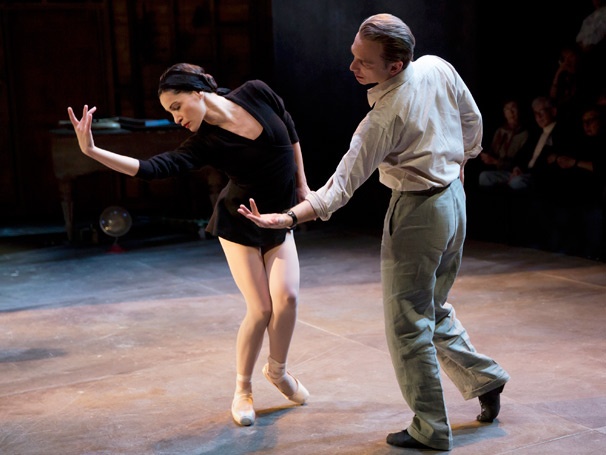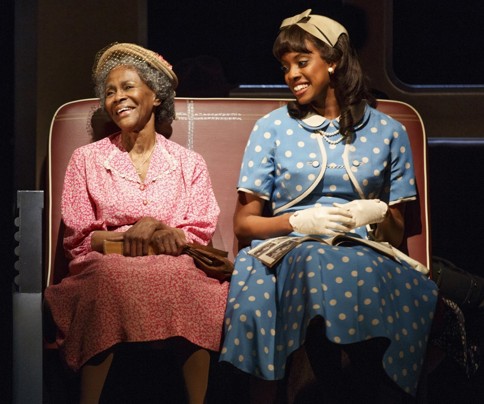In today’s Wall Street Journal drama column I review an out-of-town show, Westport Country Playhouse’s revival of A.R. Gurney’s The Dining Room, and an off-Broadway premiere, Richard Nelson’s Nikolai and the Others. The first is without flaw, the second variously problematic. Here’s an excerpt.
* * *
Nobody directs the plays of A.R. Gurney with deeper comprehension than Mark Lamos. Now that Mr. Lamos is running Connecticut’s Westport Country Playhouse, it stands to reason that he should have chosen to kick off its new season with a superior revival of “The Dining Room,” Mr. Gurney’s most fully realized portrayal of the fast-vanishing world of upper-middle-class privilege into which he was born 82 years ago. I’ve seen “The Dining Room” done extremely well in recent years, most recently in Keen Company’s 2007 Off-Broadway production, but I can’t imagine it being done better than this.
First performed Off Broadway in 1981, “The Dining Room” is a piece of virtuoso stagecraft, an extended one-act play in which six actors portray 57 characters, nearly all of whom are WASPs who live or have lived in the same old-fashioned house at various times between the 30’s and 70’s. We see them in youth and old age, joy and despair, assurance and confusion, but though they are almost always shown to us with a smile, we are never allowed to doubt that time has passed them by–and that it should have done so. It is that iron conviction which charges Mr. Gurney’s witty vignettes with the bite that keeps “The Dining Room” from dissolving into soft-centered charm….
Mr. Lamos’ ideal cast consists of Heidi Armbruster, Chris Henry Coffey, Keira Naughton, Jake Robards, Charles Socarides and Jennifer Van Dyck. They act together as though they were (dare I say it?) members of the same family….
“Nikolai and the Others,” Richard Nelson’s new history play, is actually three shows in one:
• A school-of-Chekhov character study of Igor Stravinsky (John Glover), George Balanchine (Michael Cerveris) and the other Russian émigrés who played key roles in postwar American culture.
 • A backstage play about the making of “Orpheus,” the now-classic dance that Balanchine and Stravinsky created for the New York City Ballet in 1948.
• A backstage play about the making of “Orpheus,” the now-classic dance that Balanchine and Stravinsky created for the New York City Ballet in 1948.
• An anti-anti-Communist docudrama about Nicolas Nabokov (Stephen Kunken), a second-rate émigré composer turned cultural bureaucrat who helped the CIA to secretly funnel money to the Congress of Cultural Freedom, which propagandized on behalf of liberal democracy at home and abroad by sponsoring high-culture projects of various kinds.
That’s a lot of plot for one play, especially when it contains 18 characters whose personal relationships are so knotty that they’re outlined in the cast list. Tom Stoppard himself might have had trouble shaping it into a dramatically coherent structure, and Mr. Nelson doesn’t succeed in stitching “Nikolai and the Others” together very tightly. What works best is his group portrait of the Russian-speaking community, which is sketched with sweetness and sensitivity. The part about “Orpheus,” by contrast, is insufficiently developed, while the cold-war subplot is “fictionalized” to the point of caricature, distortion and frequent falsehood….
* * *
Read the whole thing here.

 I wondered whether the same thing was happening at other performances. Then I got this e-mail from a friend who had seen the play the preceding week: “Did the audience sing along with the hymns on the night you saw ‘Bountiful’? Three women sitting next to me started singing along, softly at first, and by the second hymn a good part of the audience was joyously singing with them. The theatre was everyone’s church that night, not just mine. To describe it sounds hokey, but it was anything but.” I couldn’t agree more, and it reminded me anew that the unpredictability of the audience can be one of the most thrilling aspects of a live performance….
I wondered whether the same thing was happening at other performances. Then I got this e-mail from a friend who had seen the play the preceding week: “Did the audience sing along with the hymns on the night you saw ‘Bountiful’? Three women sitting next to me started singing along, softly at first, and by the second hymn a good part of the audience was joyously singing with them. The theatre was everyone’s church that night, not just mine. To describe it sounds hokey, but it was anything but.” I couldn’t agree more, and it reminded me anew that the unpredictability of the audience can be one of the most thrilling aspects of a live performance….